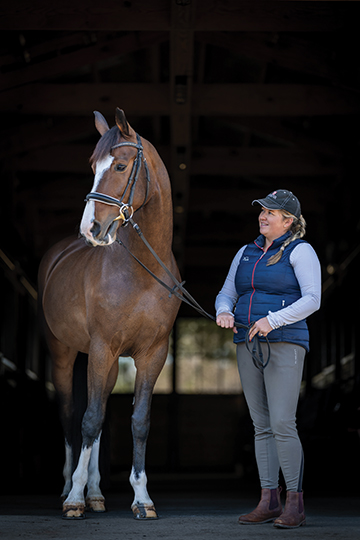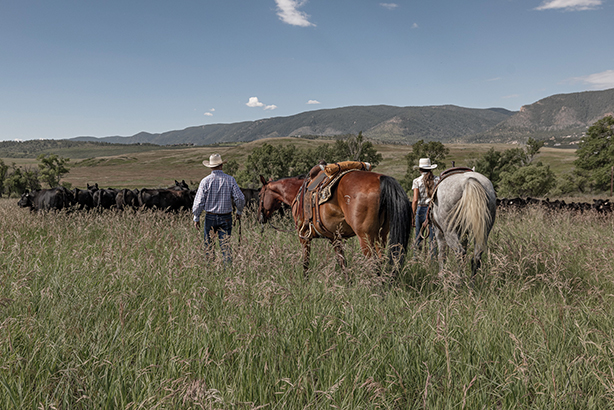Sponsored by Purina Animal Nutrition
When your horse is your teammate, you’ll do everything you can to help them perform. Purina provides consistent nutrition your horse needs at every level, with the science to back it up. Get the performance-proven, research-backed supplements and feed your horse needs at purinamills.com/horse-feed.
Horse owners often wonder when their horses should transition to senior feed. According to Anna Dunaway, Ph.D., equine nutritionist with Purina Animal Nutrition, watching for key physiological cues, such as dentition and digestion, is key to making this decision rather than relying on age alone. Senior feeds may benefit horses in need of additional calories and digestive support to ensure they get the full nutritional benefits from their feed and maintain a healthy gut.
“Senior isn’t a specific age; it’s about what’s happening inside the horse,” she explained. “As horses age, their bodies begin to change in ways that aren’t always visible at first. Being proactive with nutrition can help them stay healthier, longer.”

The Subtle Shifts of Aging
Many horses experience internal changes years before their appearance reflects them. Digestive efficiency may decline, their immune response may change, metabolisms shift and joint comfort becomes harder to maintain.
For example, older horses often do not digest fiber as well as their younger counterparts, which can affect topline and body condition over time.
“Your horse may look great at 15, but internally, the systems that keep them healthy are already adapting to new challenges,” Dunaway said. “That’s why senior feed isn’t about waiting until they’ve lost weight. It’s about supporting the body before those changes become problems.”
Signs It Is Time to Transition
Several indicators can help owners decide when to make the switch:
Digestion. Horses that struggle with frequent hay or pasture changes or weight loss despite eating plenty of forage may be showing a decline in digestive efficiency.
Topline. Even if weight looks normal, topline muscle may gradually decline.
Movement. Stiffness, slower recovery after work or inconsistent energy may signal joint discomfort.
Immune function. As horses age, they may be more susceptible to opportunistic infections. Work with a veterinarian for any sign of infection.
Metabolism. Conditions such as insulin resistance or equine metabolic syndrome become more common with age. Work with a veterinarian to test for these conditions.
“Think of senior feed as a maintenance tool to help keep your horse performing at its best,” Dunaway noted. “You don’t wait for a horse to decline — you support them before issues show up.”

Tools for Senior Care
An important way to support your aging horse is by providing them nutrition designed specifically for their needs with a senior horse concentrate or a complete senior feed.
“Complete senior feeds make it possible to maintain a healthy diet even when chewing is compromised,” said Dunaway. “But many horses may benefit from a concentrate, particularly when they still digest forage well and simply need added calories.”
Senior feed options from Purina can provide targeted support depending on the horse’s needs:
- Purina® Ultium® Senior Horse Feed is an energy dense formula designed to help seniors get the most out of their feed while fueling performance.
- Equine Senior® complete feed is designed for horses with chewing difficulties or limited forage intake.
- Enrich Plus® Senior ration balancer is ideal for easy keepers who maintain weight on forage alone but still need senior-specific nutrition.
- Purina® Equine Senior® Active is a highly digestible feed designed to be fed with hay or pasture and made for the unique nutritional needs of an aging body.
All of Purina’s senior horse feeds include ActivAge® proprietary prebiotic technology which is designed to help address common signs of aging. When fed as part of a complete feeding management plan, senior horse feeds with ActivAge® technology can support proper function of the aging horse’s immune system, mobility and appropriate metabolic response to feeding.
“Not every senior horse looks the same,” Dunaway said. “The right program depends on their workload, health history and the challenges they face as they age. Staying on top of proactive veterinary care and discussing changes you see in your horse’s behavior or physiology with your nutritionist and veterinarian is key to maintaining their health into their senior years.
A Proactive Approach to Longevity
Ultimately, Dunaway encourages owners to view senior nutrition as proactive rather than reactive.
“Senior feeds today are built on decades of science. They’re not just about calories or reaching a specific age milestone. They’re about supporting the entire horse,” she said. “By transitioning at the right time, you can give your horse the best chance to stay active, comfortable and healthy well into their senior years.”
Learn more or get in touch with a horse nutrition expert at purinamills.com/horse-feed.
Contact your local Purina representative if you would like more information about senior horse care or Purina senior horse feeds.








